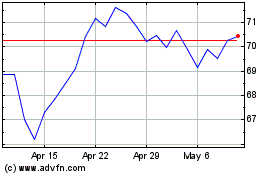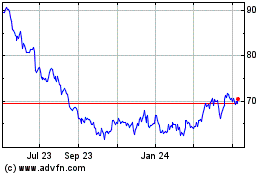General Mills Aims to Protect Coronavirus Sales Boost -- 3rd Update
September 23 2020 - 12:23PM
Dow Jones News
By Annie Gasparro
General Mills Inc. said the coronavirus-fueled surge in grocery
sales is waning, increasing pressure on food makers to hold on to
the new shoppers who tried their brands during the height of the
pandemic.
The packaged-food industry has caught a tailwind for much of
this year because the pandemic has changed how consumers approached
food. Families have bought more groceries to eat at home amid
closures of restaurants and capacity limitations on dining
rooms.
General Mills said Wednesday that it has gained market share in
cereal, pet food and other categories in the latest quarter. Its
sales rose 10% on a comparable basis, which excludes currency
fluctuations and the effect of deals.
That growth was slower than in the spring, when consumers
broadly quarantined at home. General Mills said the reopening of
restaurants and easing of pandemic-related restrictions in recent
months has contributed to the moderating in its sales growth.
Campbell Soup Co. said earlier this month that the pace of its
sales growth had also moderated in its latest quarter.
General Mills, maker of Cheerios, Yoplait and Betty Crocker,
said it is making investments designed to hang on to the ground it
has gained in the past six months, such as increased marketing
spending and added supply-chain capacity. Chief Executive Jeff
Harmening said he doesn't want to look back after the pandemic and
see that General Mills didn't do enough to capitalize on the
unprecedented shift to eating at home.
"We're doing everything we can now, because when the pandemic is
over, I want people to remember how great our food is," he said in
an interview.
Shares rose 1.9% to $59.10.
Mr. Harmening said that new consumers are trying General Mills
products because of the pandemic and that sales data indicate they
are returning to purchase more. He said ingredient changes that
General Mills made in recent years to make its products trendier,
tastier or more nutritious have helped draw people back.
Some food makers, such as Campbell and Kraft Heinz Co., have
struggled to maintain market share amid the pandemic. Campbell
couldn't make enough of its Pepperidge Farm Goldfish crackers to
meet demand. It recently added production capacity.
Analysts said Kraft Heinz has lost shoppers to lower-priced
store brands of cheese, deli meat and coffee. Last week, the
company said it would sell off a large chunk of its cheese business
and further cut costs, while continuing to increase marketing
spending.
Some investors have questioned the need for companies such as
General Mills and Campbell Soup to spend more on marketing while
demand for their products is so high. But even with the added
costs, General Mills' profit margin improved in the latest
quarter.
Profit in the quarter ended Aug. 30 rose to $638.9 million, or
$1.03 a share, from $520.6 million, or 85 cents a share, in the
same period a year earlier. The company's adjusted profit of $1 a
share surpassed the 87 cents a share that analysts expected.
Revenue rose to $4.36 billion from $4 billion a year ago.
General Mills' North America grocery business logged 14% sales
growth. The Minneapolis-based company said sales grew for products
such as Pillsbury refrigerated baked goods, Betty Crocker dessert
mixes and Progresso soup. Its U.S. cereal sales were up 10%. Snack
sales fell 2%.
--Micah Maidenberg contributed to this article.
Write to Annie Gasparro at annie.gasparro@wsj.com
(END) Dow Jones Newswires
September 23, 2020 12:08 ET (16:08 GMT)
Copyright (c) 2020 Dow Jones & Company, Inc.
General Mills (NYSE:GIS)
Historical Stock Chart
From Mar 2024 to Apr 2024

General Mills (NYSE:GIS)
Historical Stock Chart
From Apr 2023 to Apr 2024
